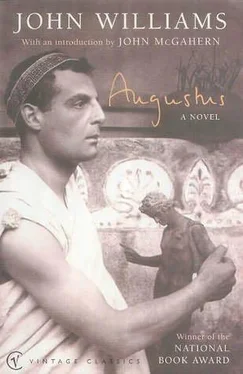John Williams - Augustus
Здесь есть возможность читать онлайн «John Williams - Augustus» весь текст электронной книги совершенно бесплатно (целиком полную версию без сокращений). В некоторых случаях можно слушать аудио, скачать через торрент в формате fb2 и присутствует краткое содержание. Жанр: Историческая проза, на английском языке. Описание произведения, (предисловие) а так же отзывы посетителей доступны на портале библиотеки ЛибКат.
- Название:Augustus
- Автор:
- Жанр:
- Год:неизвестен
- ISBN:нет данных
- Рейтинг книги:3 / 5. Голосов: 1
-
Избранное:Добавить в избранное
- Отзывы:
-
Ваша оценка:
- 60
- 1
- 2
- 3
- 4
- 5
Augustus: краткое содержание, описание и аннотация
Предлагаем к чтению аннотацию, описание, краткое содержание или предисловие (зависит от того, что написал сам автор книги «Augustus»). Если вы не нашли необходимую информацию о книге — напишите в комментариях, мы постараемся отыскать её.
Augustus — читать онлайн бесплатно полную книгу (весь текст) целиком
Ниже представлен текст книги, разбитый по страницам. Система сохранения места последней прочитанной страницы, позволяет с удобством читать онлайн бесплатно книгу «Augustus», без необходимости каждый раз заново искать на чём Вы остановились. Поставьте закладку, и сможете в любой момент перейти на страницу, на которой закончили чтение.
Интервал:
Закладка:
Agrippa says: "It was no game. The man was deadly serious."
Octavius, still smiling: "Of course he was serious; but don't you see? He was afraid of us. He was more afraid of us than we are of him, and he doesn't know it. He doesn't even know it. That's the joke."
I start to shake my head, but Agrippa and Maecenas are looking strangely at Octavius. Long silence. Maecenas nods, face softens; shrugs with his old affectation, says negligently, pretending to be cross: "Oh, well, if you're going to be priestly about it, divining the hearts of men-" He shrugs again.
We go to bathe. We shall have dinner and talk later.
We are in accord; no precipitate action. We speak of Antonius, knowing that he is our obstacle. Agrippa sees him as the source of power. But how to get at it? We have no force of our own to wrest it from him, even if we dared to do so. We must somehow make him recognize us; that will be the first tiny advantage we have. Too dangerous to raise an army now, even to avenge the murder; Antonius's position in the matter too ambiguous. Does he want to avenge the murder as we do? Does he want only power? It is even possible that he was one of the conspirators. In the Senate, he supported an act that forgave the murderers, and gave Brutus a province.
Maecenas sees him as man of great force and action but unable to conceive the end to which action is directed. "He plots; he doesn't plan," Maecenas says. Unless he has discernible enemy, he will not move. But he must be made to move, otherwise we are at stalemate. Problem: How to make him move without his discovering his own fear of us.
I speak with some hesitation. Will they think me too timid? I say that I see Antonius as committed to same ends as ourselves. Powerful, support of legions, etc. Friend of Caesar. Brusqueness toward us not forgivable but understandable. Wait. Convince him of our loyalty. Offer our services. Work with him, persuade him to use his power to ends we have discussed.
Octavius says slowly: "I do not trust him, because there is a part of him that does not trust himself. Going to him would fix us too firmly in his course, and neither Antonius nor we know surely enough where that course leads him. If we are to be free to do what we must do, he must be made to come to us."
There is more talk; a plan emerges. Octavius is to speak to the people-here and there, small groups, nothing official. Octavius says: "Antonius has persuaded himself that we are innocents, and it is to our advantage that he continue that self-deception." So we will say nothing inflammatory-but we will wonder aloud why murderers have not been punished, why Caesar's bequest to the people has not been made, why Rome has forgotten so quickly.
And then an official speech to the populace in which Octavius announces that Antonius is unable (unwilling?) to release the monies to pay them, and that Octavius himself, out of his own pocket, will give them that which Caesar promised.
More discussion. Agrippa says that Octavius will have depleted his own fortune if Antonius does not release the funds then, and that if an army is needed we shall be helpless. Octavius replies that without the good will of the people, an army will be useless in any event; that we will buy power without seeming to want power; and that Antonius will be forced to move, one way or another.
It is settled. Maecenas will draft the speech, Octavius will finish it, we begin tomorrow. Octavius says to Maecenas: "And remember, my friend, that this is to be a simple speech, not a poem. In any event, I'm sure I'll have to untangle your inimitably labyrinthine prose."
They are wrong. Marcus Antonius has no fear of us or anyone.
IX. Letter: Gains Cilnius Maecenas to Titus Livius (13 B. c.)
Some years ago my friend Horace described to me the way he made a poem. We had had some wine and were talking seriously, and I believe that his description then was a more accurate one than that contained more recently in the so-called Letter to the Pisos-a poem upon the art of poetry of which, I must confess, I am not particularly fond. He said: "I decide to make a poem when I am compelled by some strong feeling to do so-but I wait until the feeling hardens into a resolve; then I conceive an end, as simple as I can make it, toward which that feeling might progress, though often I cannot see how it will do so. And then I compose my poem, using whatever means are at my command. I borrow from others if I have to-no matter. I invent if I have to-no matter. I use the language that I know, and I work within its limits. But the point is this: the end that I discover at last is not the end that I conceived at first. For every solution entails new choices, and every choice made poses new problems to which solutions must be found, and so on and on. Deep in his heart, the poet is always surprised at where his poem has gone."
I thought ofthat conversation this morning when I sat down to write you once again of those early days; and it occurred to me that Horace's description of the making of a poem had certain striking parallels to our own working out of our destinies in the world itself (though if Horace heard this, and recalled what he said, he would no doubt scowl dourly and say that it was all nonsense, that you made a poem by discovering a topic, disposing the topic properly, by playing this figure against that, by this disposition of the meter against that sense of the language, and so forth and so on).
For our feeling-or, rather, Octavius's feeling, in which we were caught up as the reader is caught in a poem-was occasioned by the incredible murder of Julius Caesar, an event which seemed more and more to have simply destroyed the world; and the end that we conceived was to have revenge upon the murderers, for the sake of our honor and the state's. It was as simple as that, or it appeared to be. But the gods of the world and the gods of poetry are wise, indeed; for how often they save us from the ends toward which we think we strive!
My dear Livy, I do not wish to play the father with you; but you did not even come to Rome until our Emperor had fulfilled his destiny and was master of the world. Let me tell you a little of those days, so that you might reconstruct, these many years later, the chaos that we confronted in Rome.
Caesar was dead-by the "will of the people," the murderers said; yet the murderers had to barricade themselves in the Capitol against those very people who had "commanded" the act. Two days later, the Senate gave its thanks to the assassins; and in the next breath approved and made law those very acts of Caesar for the proposal of which he had been killed. However terrible the deed, the conspirators had acted with bravery and force; and then they scattered like frightened women after they had taken their first step. Antonius, as Caesar's friend, roused the people against the assassins; yet the night before the Ides of March he had entertained the murderers at dinner, was seen speaking intimately with one of them (Trebonius) at the instant of the murder, and dined again with those same men two nights later! He aroused the populace again to burn and loot in protest against the murder; and then approved their arrest and execution for that lawlessness. He made Caesar's will to be read publicly; and then opposed its enactment with all his power.
Above all, we knew that we could not trust Antonius, and we knew him to be a formidable foe-not because of his shrewdness and skill, but because of his thoughtlessness and reckless force. For despite the sentimental regard in which some of the young now hold him, he was not a very intelligent man; he had no real purpose beyond the moment of his will; and he was not exceptionally brave. He did not even perform his own suicide well, and he did it long after his situation was hopeless, so that it was too late for it to be done with dignity.
Читать дальшеИнтервал:
Закладка:
Похожие книги на «Augustus»
Представляем Вашему вниманию похожие книги на «Augustus» списком для выбора. Мы отобрали схожую по названию и смыслу литературу в надежде предоставить читателям больше вариантов отыскать новые, интересные, ещё непрочитанные произведения.
Обсуждение, отзывы о книге «Augustus» и просто собственные мнения читателей. Оставьте ваши комментарии, напишите, что Вы думаете о произведении, его смысле или главных героях. Укажите что конкретно понравилось, а что нет, и почему Вы так считаете.











